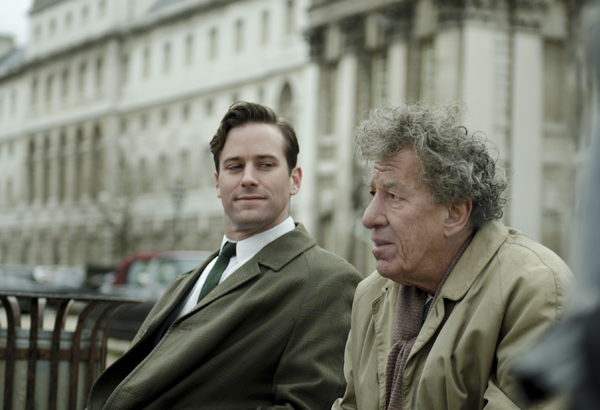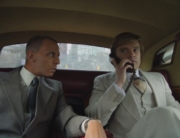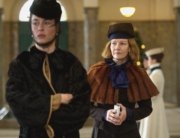There is no shortage of movies that romanticize the artist, but this relatively upbeat drama is not one of them. Set in 1964 Paris, it opens with American author James Lord (Armie Hammer) accepting an invitation to pose for a portrait by the famous Alberto Giacometti (the inimitable Geoffrey Rush). Before long, James visits Giacometti’s studio, which looks surprisingly rundown, and when meeting Giacometti for the first time, the artist is preoccupied with his sculptures and barely acknowledges his guest.
These early scenes are told from James’ point of view and filmed in a manner resembling real time that captures the tediousness of waiting for Alberto to get started. It’s during their initial session that the latter says it’s impossible to truly finish a portrait, a comment James brushes aside, but he really should have taken as a warning of what’s to come. Soon he gets the full picture of the artist’s dysfunctional environment as a gamine prostitute, Caroline (Clémence Poésy), drops by, causing distress to Alberto’s wife, Annette (Sylvie Testud).
James comes back the next afternoon, during which Alberto again does little work, and once more the session ends with Caroline in their midst and Alberto asking him to come back. Of course, they are now nearing James’s departure date, and although the portrait is far from finished, the artist says that he just needs a few more days. James pushes his trip back, and he and Alberto even agree to a date of completion, with James having not yet learned that he is dealing with a man who lives by his own rules.
Final Portrait is the fifth feature by director Stanley Tucci, who has specialized in movies about unusual forms of creative expression. His debut (co-directed with Campbell Scott) was Big Night, about flailing Italian chefs in New Jersey who prepare a feast for the ages, and he later helmed Blind Date, centered on a married couple who repeatedly pose as strangers to try and get over a shared tragedy. Though Tucci’s latest is easily less heartbreaking than Blind Date, it similarly depicts a kind of creativity that doesn’t lead to actual creation, merely a loop that threatens to repeat in perpetuity: James and Alberto set a deadline, the latter mostly dillydallies, but somehow he convinces James to extend his stay further. They set another deadline and on and on.
Tucci assembles a fine cast around Rush, who as Giacometti has an infinite well of self-loathing, but as the days pass, he seems genuinely happy at times. It may have to do with a comment made by Alberto’s brother and assistant, Diego (Tony Shalhoub), that his brother’s ideal condition is one in which he is “perfectly uncomfortable.” In this case, Anna gives him the death glare, and Caroline wants him to lavish money onto her. Meanwhile, James comes by every morning to chat, pose behind the canvas, and go for walks or have coffee with him. Why would Giacometti change this by finishing the painting?
Speaking of James, he is well played by Hammer, who brings sophistication reminiscent of his performance in the acclaimed Call Me by Your Name. He also has a more important role than we initially realize, as along with serving as the proverbial straight man, he occasionally visits a local swimming pool to stretch his limbs after hours spent sitting. During these brief, slow-motion sequences, both he and the audience get to temporarily forget about the domestic tension and drab colors of Giacometti’s world. Testud and Poésy are also excellent as diametrically opposed rivals. Anna, who is frequently glimpsed through windows and other reflective surfaces, has an ethereal quality, while Caroline is a force of nature constantly in motion, upsetting the order of people and objects in whatever space she occupies.
If the film leaves a bad taste for any reason, it’s the fact that Giacometti seems like the latest iteration of a tiresome cliché—the troubled artist who has foibles everyone is supposed to tolerate, because in the end, his work is brilliant. But it’s hard to overlook how inconsiderate he is to James, or the times in which he treats Caroline, who walks in and out of his life, far better than his wife, who takes care of all his practical needs. The ending also seems arbitrary, but in hindsight, might just be very straightforward.
There is no twist ending, just the realization that a particular situation might continue ad infinitum, which would be the worst outcome.







Leave A Comment